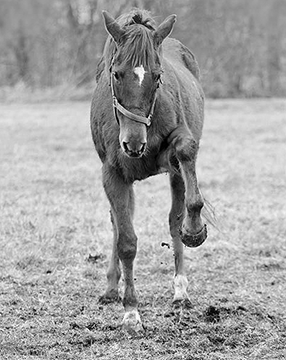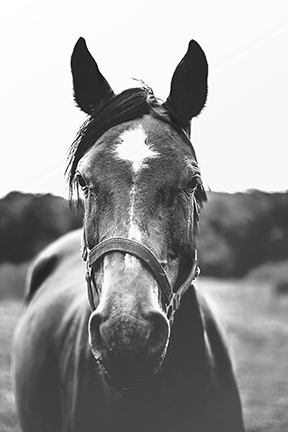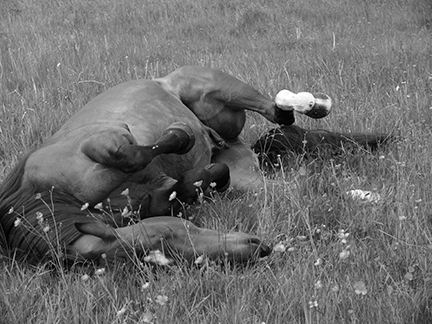Overview of Colic
You probably know of a human baby with colic. It’s generally a pain in the tummy and can cause crying and loss of appetite. But it’s not a disease. In horses, colic is not a disease, but rather a clinical sign. It’s a broad term because conditions can vary widely.
Inside the horse’s abdomen, something has gone awry. Colic in horses accounts for up to 50% of equine medical visits with a veterinarian so yes, it is common, but the commonality doesn’t mean it isn’t serious and should not be taken lightly. Now, sometimes colic can be an accumulation of gas or mild impaction that the horse can pass on its own.
But sometimes this gas is caused by dietary changes, changes in weather conditions, other disease processes, dehydration, and more. If left untreated, the stomach or another portion of the gastrointestinal tract can actually rupture, which is fatal. But if the condition is recognized early, surgery can prevent this devastation for the horse and the owner. Depending on where the obstruction is, whether small or large intestine, and whether or not the treatment is delayed, is paramount in the outlook.
In mild cases, the horse may be treated with pain medication, fluid treatment, neutralization of toxins, deworming, or intestinal lubricants and laxatives.

WARNING
*DO NOT* attempt to treat the horse yourself. Only our veterinarian can properly assess if the situation is minor or major.
Colic in horses is most serious when there are strangulations or a “pinching off” of sections of the intestine which causes blood flow to be cut off, and the affected tissue dies. When this happens, early detection and emergency surgery is the only way to save him.
Causes and Signs
Aside from obstructions, some other causes of colic include:
– Adhesions
– Inflammation of the small intestine
– Lipomas
– Twisting or Displacement of the small or large intestine
– Inguinal hernias
– Intestinal stones (enteroliths)
Thankfully, here at Rocky Valley Veterinary Services, we have access to advanced diagnostics and treatments. These superior advances in technology it easier for us to identify the causes of colic and be able to treat the condition to help more horses recover completely. But owners must be proactive in obtaining treatment at the onset.
So, how do you know if your horse is exhibiting signs of colic? Well, some horses are more stoic than others and appear withdrawn and gloomy. Others may become more flustered or frantic. But, regardless, their personality change might be a sign of trouble.
Other signs may include:
– Repeated pawing with a front foot
– Sweating
– Lying down and rolling
– Looking back at the flank area with ears pinned back
– Curling the upper lip and arching the neck
– Refusal to eat
– Lack of manure or straining to defecate
– Stretching out as if to urinate
– Kicking at the abdomen
– Distention of the abdomen
Of course, the horse will not display all of these symptoms and can’t indicate which area of the digestive system is affected. Even if he passes gas or manure, it doesn’t mean he’s out of the woods yet.
What You Can Do
If it’s safe, go ahead and take the horse’s vitals if you can. If his heart rate is over 60 beats per minute, he may be in very serious pain.
Take his temperature and jot that down too.
Take his temperature and jot that down too.
Are his gums pale indicating signs of shock? Or, are the gums dark, brick-red indicating dehydration or a toxic condition?
While you wait for us to arrive, there are important things to do, all while monitoring vital signs.

– Remove all food and water. Usually, they won’t want to eat or drink anyway, but if they do, it could worsen the problem, or cause more impaction and blockage.
– Decide whether or not to walk him. It’s a myth that you must walk a horse with colic, so if he’s more comfortable lying down, don’t disturb him. If he’s restless, getting up and lying down, it might be good to walk him to settle him down. But if he’s acting violent and thrashing around, don’t risk your own safety. Just leave him alone but keep an eye on him until we get there.
– Collect and save any manure the horse passes.
– Prepare to have transport arranged if necessary. Rocky Valley Veterinary Services has access to emergency haulers if needed. Get yourself organized; get your phone and charger, insurance records, Coggins papers, or anything else that may be relevant to the case.

If the horse does require surgery it will need to be transported by you (or another hauling service) to UT or a referral hospital of your choice.
***IMPORTANT***
Do not administer any medication without the direction of the veterinarian. Doing so may mask pain and fever, which only exacerbates the problem by making the diagnosis much harder.
If you suspect any signs of colic, call us immediately at 865-566-8359. For our established clients we have 24/7 emergency care. If you’re not an established client, please consider our compassionate, professional staff to provide exceptional care for your horse. Be sure to bookmark our website: www.rockyvalleyvet.com
Looking for more content? Check out our other blogs

 Breathing Is Important. Let’s Talk About Horse Heaves.
Breathing Is Important. Let’s Talk About Horse Heaves.
Leave a Reply